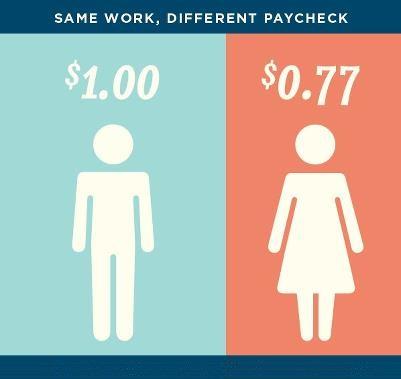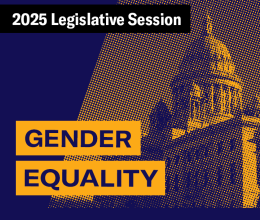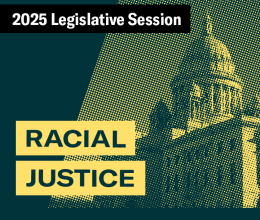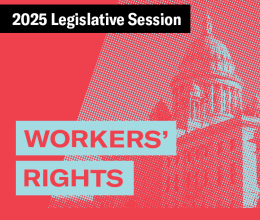If General Assembly leaders thought paying lip service to women’s rights would satisfy Rhode Islanders, the past two weeks have proven them sorely mistaken. In the short time since legislators concluded their business, their failure to act on separate bills addressing sexual harassment in the workplace and reproductive rights – along with the Democratic Party’s refusal to endorse three progressive women incumbents for office – has generated enormous political controversy.
Yet despite all this controversy, one of the most stunning actions taken by the House of Representatives on women’s rights during the session’s final days has hardly been mentioned: the overwhelming support by House members for a bill that would have WEAKENED the state's existing equal pay law. When an anti-discrimination bill is gutted and transformed into one that rolls back civil rights protections – when 66 legislators are willing to turn the clock back on women’s rights and call it progress – it is no surprise that women’s rights in general were treated so badly.
 Rhode Island's existing equal pay law, barring “Wage Discrimination Based on Sex,” has not been updated in more than a half of a century, and it shows. It is a very weak law. This year, bills introduced in the both the Senate and the House sought to strengthen the current law in various ways and help close the well-known workplace wage gap between men and women. Based on a Massachusetts law, the Senate “fair pay” bill, sponsored by Sen. Gayle Goldin, passed the Senate unanimously.
Rhode Island's existing equal pay law, barring “Wage Discrimination Based on Sex,” has not been updated in more than a half of a century, and it shows. It is a very weak law. This year, bills introduced in the both the Senate and the House sought to strengthen the current law in various ways and help close the well-known workplace wage gap between men and women. Based on a Massachusetts law, the Senate “fair pay” bill, sponsored by Sen. Gayle Goldin, passed the Senate unanimously.
On the House side, it was a different story altogether. When the House bill finally made its way out of Labor Committee in late June, it had been revised so dramatically that the advocacy groups behind the legislation ended up opposing it. The revised bill actually made the existing equal pay law worse - in many important ways, and in ways that were specifically noted during the debate on the House floor. It was thus all the more astonishing when the House not only passed the bill overwhelmingly, but passed it with the support of 19 of 23 female members. We will leave it up to readers to ask their legislators, some of whom have undoubtedly faced wage discrimination in their own lives, why they voted against the interests of women in this way.*
In the meantime, here's a look at how this amended bill undermined the current law:
- Current statute: Only two categories of employment are exempt from the law’s protection: home domestic workers and employees of any non-profit “social club, fraternal, charitable, educational religious, scientific or literary association.” House-passed bill: In addition to those exemptions, the bill excluded from coverage many more occupations, including all temporary and seasonal workers, newspaper carriers, traveling salespersons, and theater ushers.
- Current statute: All employees not otherwise exempt because of their occupation are protected from wage discrimination, regardless of the size of the business they work for. House-passed bill: The bill revised the Act so that only individuals who worked for employers with eighteen or more employees were protected.
- Current statute: Victims of wage discrimination can go into court to vindicate their rights and obtain their unpaid wages and an “additional equal amount of liquidated damages.” House-passed bill: The bill eliminated any private cause of action in court by aggrieved employees. Instead, any complaints would need to be filed with the Department of Labor and Training (DLT), which could then commence administrative proceedings against an employer.
- Current statute: It is a misdemeanor for an employer to retaliate against an employee for filing a complaint or for testifying about violations of the statute. House-passed bill: The bill eliminated this section and instead included a limited retaliatory protection provision dealing solely with inquiries and disclosures regarding wage payments and salary history.
- Current statute: Nothing prohibits municipalities from enacting – and Providence has, in fact, enacted – stronger equal pay provisions than those that exist in the Act. House-passed bill: Municipalities were barred from adopting stronger provisions against wage discrimination than those provided by the state law.
- Current statute: The DLT retains the implicit authority to adopt regulations to implement the statute. House-passed bill: In a significant departure from the general state rule-making process, the bill required DLT to obtain General Assembly approval before any regulations it adopted could take effect.
It is true that the bill did contain a few additions to the current law: it barred wage discrimination on the basis of race or color as well as sex, and included a general ban on asking job applicants about their salary history, but the whole thrust of the House-passed bill was to leave unprotected tens of thousands of employees currently protected by the Act.
Compromise is the name of the game at the General Assembly. But when a bill to promote fair pay for women is used as a vehicle to undermine equal rights – and when it does so with the acquiescence of over 80% of the House of Representatives – something is terribly wrong. Unless we come to grips with this vote, it is hardly puzzling to see a lack of progress on other issues of gender equality.
In the meantime, the nine Representatives who voted against the bill deserve a shout-out for refusing to waver in the fight for equal rights: Reps. Edith Ajello, Raymond Hull, Jason Knight, Jared Nunes, Jeremiah O’Grady, Marcia Ranglin-Vassell, Aaron Regunberg, Teresa Tanzi, and Moira Walsh. We applaud their commitment to moving women’s rights truly forward. If one of them is your Representative, please take the time to thank them. If your Representative is not on that list, call to let them know you are deeply upset at their vote for a bogus “equal pay” bill that promoted discrimination in the guise of supporting women’s rights.
Now let’s see what next session brings.






